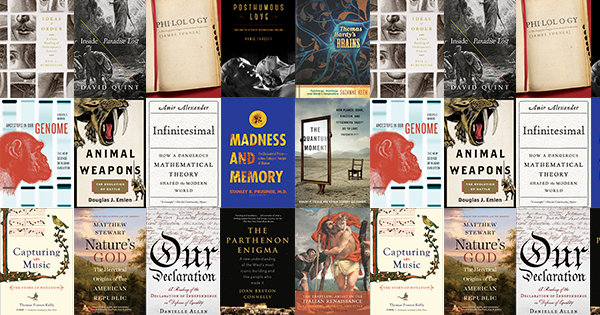The Phi Beta Kappa Awards Short List
Fifteen books are in the running for three $10,000 awards

Our beloved parent organization, the Phi Beta Kappa Society, just announced the short list for its three annual book awards. Each award carries a handsome $10,000 prize and includes free bragging rights. The winning titles will be announced on October 1, 2015. May the best tome win.
This year the titles on the short lists, listed alphabetically, are:
For The Christian Gauss Award:
- Ideas of Order: A Close Reading of Shakespeare’s Sonnets, by Neil L. Rudenstine; Farrar, Straus and Giroux
- Inside Paradise Lost: Reading the Designs of Milton’s Epic, by David Quint; Princeton University Press
- Philology: The Forgotten Origins of the Modern Humanities, by James Turner; Princeton University Press
- Posthumous Love: Eros and the Afterlife in Renaissance England, by Ramie Targoff; University of Chicago Press
- Thomas Hardy’s Brains: Psychology, Neurology, and Hardy’s Imagination, by Suzanne Keen; Ohio State University Press
The Christian Gauss Award goes to books in the field of literary scholarship or criticism. The prize, created in 1960, honors the late Christian Gauss, the distinguished Princeton University scholar, teacher, and dean who also served as President of The Phi Beta Kappa Society.
For The Phi Beta Kappa Award in Science:
- Ancestors in Our Genome: The New Science of Human Evolution, by Eugene E. Harris; Oxford University Press
- Animal Weapons: The Evolution of Battle, by Douglas J. Emlen; Henry Holt and Co.
- Infinitesimal: How a Dangerous Mathematical Theory Shaped the Modern World, by Amir Alexander; Scientific American
- Madness and Memory: The Discovery of Prions—A New Biological Principle of Disease, by Stanley B. Prusiner; Yale University Press
- The Quantum Moment: How Planck, Bohr, Einstein, and Heisenberg Taught Us to Love Uncertainty, by Robert P. Crease and Alfred Scharff Goldhaber; W. W. Norton
Since 1959, The Phi Beta Kappa Award in Science has recognized outstanding contributions by scientists to the literature of science. The intent of the award is to encourage literate and scholarly interpretations of the physical and biological sciences and mathematics.
For The Ralph Waldo Emerson Award:
- Capturing Music: The Story of Notation, by Thomas Forrest Kelly; W. W. Norton
- Nature’s God: The Heretical Origins of the American Republic, by Matthew Stewart; W. W. Norton
- Our Declaration: A Reading of the Declaration of Independence in Defense of Equality, by Danielle Allen; Liveright
- The Parthenon Enigma, by Joan Breton Connelly; Knopf
- The Traveling Artist in the Italian Renaissance: Geography, Mobility, and Style, by David Young Kim; Yale University Press
Established in 1960, The Ralph Waldo Emerson Award honors scholarly studies that contribute significantly to interpretations of the intellectual and cultural condition of humanity, including works in the fields of history, philosophy, and religion as well as such fields as anthropology and the social sciences.


